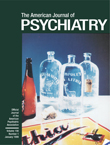Effect of Clozapine and Adjunctive High-Dose Glycine in Treatment-Resistant Schizophrenia
Abstract
OBJECTIVE: The focus of this study was the systematic evaluation of the clinical effects of glycine as an adjunct to the atypical antipsychotic clozapine in the treatment of schizophrenia. METHOD: In a double-blind, placebo-controlled study, 19 patients with chronic, treatment-resistant schizophrenia who were maintained on optimal doses of clozapine (400–1200 mg/day) were administered either 30 g/day of glycine (N=9) or placebo (N=10) for 12 weeks. Clinical evaluations with the Brief Psychiatric Rating Scale, the Scale for the Assessment of Negative Symptoms, and the Simpson-Angus movement scale were completed biweekly. RESULTS: The use of glycine as an adjunct to clozapine was not effective in decreasing positive or negative symptoms. In contrast, the patients treated with clozapine without glycine had a 35% reduction in positive symptoms. CONCLUSIONS: These preliminary data suggest that glycine may interfere with the antipsychotic efficacy of atypical neuroleptics such as clozapine.



